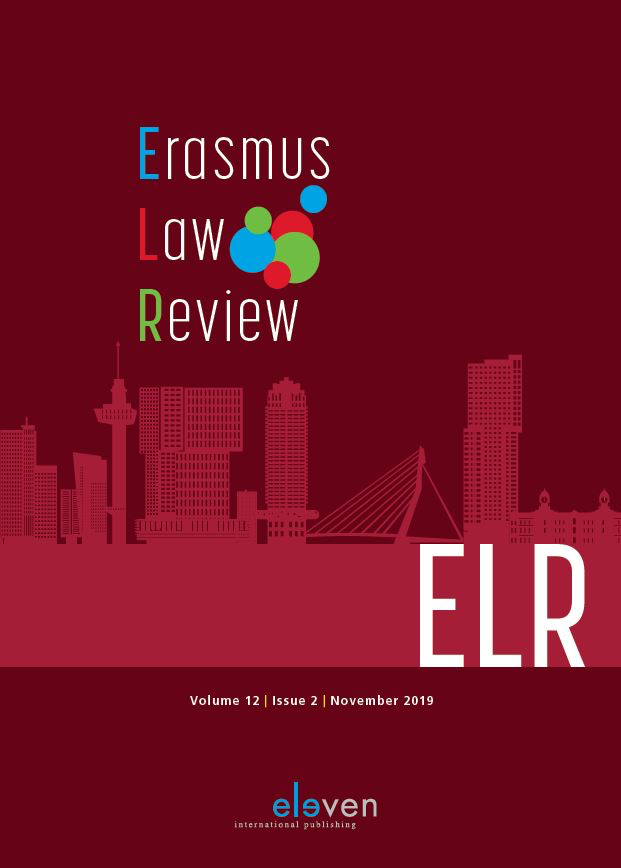|
The global financial crisis of 2008 and the following public uproar over offshore tax evasion and corporate aggressive tax planning scandals gave rise to unprecedented international cooperation on tax information exchange and coordination on corporate tax reforms. At the behest of the G20, the OECD developed a comprehensive package of ‘consensus-based’ policy reform measures aimed to curb base erosion and profit shifting (BEPS) by multinationals and to restore fairness and coherence to the international tax system. The legitimacy of the OECD/G20 BEPS Project, however, has been widely challenged. This paper explores the validity of the legitimacy concerns raised by the various stakeholders regarding the OECD/G20 BEPS Project. |


Erasmus Law Review
Over dit tijdschriftMeld u zich hier aan voor de attendering op dit tijdschrift zodat u direct een mail ontvangt als er een nieuw digitaal nummer is verschenen en u de artikelen online kunt lezen.
| Editorial |
|
| Auteurs | Arnaud de Graaf |
| Auteursinformatie |
| Article |
|
| Trefwoorden | base erosion and profit shifting, OECD, G20, legitimacy, international tax reform |
| Auteurs | Sissie Fung |
| SamenvattingAuteursinformatie |
| Article |
|
| Trefwoorden | Global Forum on Transparency and Exchange of Information, exercise of regulatory authority, due process requirements, peer review reports, legitimacy |
| Auteurs | Leo E.C. Neve |
| SamenvattingAuteursinformatie |
|
The Global Forum on transparency and exchange of information for tax purposes has undertaken peer reviews on the implementation of the global standard of exchange of information on request, both from the perspective of formalities available and from the perspective of actual implementation. In the review reports Global Forum advises jurisdictions on required amendments of regulations and practices. With these advices, the Global Forum exercises regulatory authority. The article assesses the legitimacy of the exercise of such authority by the Global Forum and concludes that the exercise of such authority is not legitimate for the reason that the rule of law is abused by preventing jurisdictions to adhere to due process rules. |
| Article |
|
| Trefwoorden | legitimacy, International Monetary Fund (IMF), Article IV Consultations, tax recommendations, global tax governance |
| Auteurs | Sophia Murillo López |
| SamenvattingAuteursinformatie |
|
This contribution examines the legal legitimacy of ‘Article IV Consultations’ performed by the IMF as part of its responsibility for surveillance under Article IV of its Articles of Agreement. The analysis focuses on tax recommendations given by the Fund to its member countries in the context of Consultations. This paper determines that these tax recommendations derive from a broad interpretation of the powers and obligations that have been agreed to in the Fund’s Articles of Agreement. Such an interpretation leads to a legitimacy deficit, as member countries of the Fund have not given their state consent to receive recommendations as to which should be the tax policies it should adopt. |
| Article |
|
| Trefwoorden | World Bank, legality, legitimacy, global tax governance, tax policy and tax administration reforms |
| Auteurs | Uyanga Berkel-Dorlig |
| SamenvattingAuteursinformatie |
|
The emergence of global tax governance was triggered by common tax problems, which are now still being faced by international society of nation-states. In the creation of this framework, international institutions have been playing a major role. One of these institutions is the World Bank (Bank). However, those who write about the virtues and vices of the main creators of the framework usually disregard the Bank. This article, therefore, argues that this disregard is not justified because the Bank has also been playing a prominent role. Since two informal decisions taken in the past have contributed to this position of the Bank, the article gives in addition to it answers to the following two related questions: whether these informal decisions of the Bank were legal and if so, what implications, if any, they have for the Bank’s legitimacy. |

 Aflevering 3
Aflevering 3